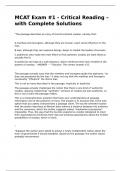Exam (elaborations)
MCAT Exam #1 - Critical Reading – with Complete Solutions
- Course
- Institution
MCAT Exam #1 - Critical Reading – with Complete SolutionsMCAT Exam #1 - Critical Reading – with Complete SolutionsMCAT Exam #1 - Critical Reading – with Complete SolutionsMCAT Exam #1 - Critical Reading – with Complete SolutionsMCAT Exam #1 - Critical Reading – with Complete Solutions "T...
[Show more]



